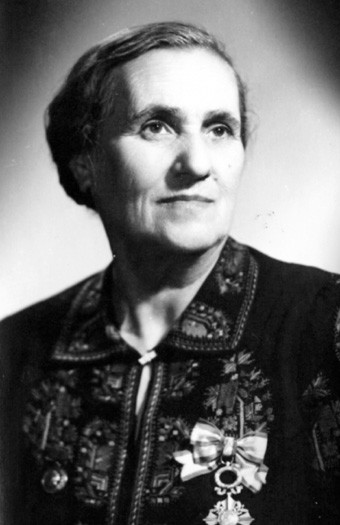2015 is a year of celebrations of the 120 birth anniversary of renowned folk singer Gjurga Pindjurova.
 Born in the western town of Trun, Gjurga Pindjurova was first taught how to sing folk songs by her mother. Once the great singer recalled: “During the summer she took me to the field for harvesting. There I learned the beautiful harvest songs and I remember them even today.” Gjurga's music talent made itself obvious in secondary school and teachers encouraged her to take up music. The encounter of the girl from Trun with opera singer Hristina Morfova turned out fateful. With her support Gjurga Pindjurova enrolled in the State Music School in Sofia and later graduated the Prague Conservatory with a major in opera singing. Pindjurova returned to Bulgaria despite her good prospects for a career in opera and a bunch of invitations to sing in the Czech Republic and Austria. At first, the singer became a teacher in her native region of Trun. She later moved to Sofia and started her concert activities often combining operatic arias with folk songs.
Born in the western town of Trun, Gjurga Pindjurova was first taught how to sing folk songs by her mother. Once the great singer recalled: “During the summer she took me to the field for harvesting. There I learned the beautiful harvest songs and I remember them even today.” Gjurga's music talent made itself obvious in secondary school and teachers encouraged her to take up music. The encounter of the girl from Trun with opera singer Hristina Morfova turned out fateful. With her support Gjurga Pindjurova enrolled in the State Music School in Sofia and later graduated the Prague Conservatory with a major in opera singing. Pindjurova returned to Bulgaria despite her good prospects for a career in opera and a bunch of invitations to sing in the Czech Republic and Austria. At first, the singer became a teacher in her native region of Trun. She later moved to Sofia and started her concert activities often combining operatic arias with folk songs.
Gjurga Pindjurova owed her enormous popularity to the Bulgarian National Radio. At its very beginnings in 1935 the singer was a regular guest to its programs presenting her characteristic Trun repertoire. She sang live in broadcasts with the folklore group Thracian Troika, and sometimes performed with piano accompaniment. Gjurga Pindjurova's experience on radio also included The Children's Hour: every Sunday she sang songs for the youngest radio listeners. This made the great singer the favorite of radio audiences and she pioneered the promotion of the original Trun folk songs. In 1950s and 1960s she made recordings for the National Radio's Golden Archives. In the meantime, Gjurga Pindjurova was busy touring the country extensively and giving concerts, most often with Our Song group.
With her gentle and warm voice and distinct dialect Gjurga Pindjurova popularized many songs from her region adding to her rendition the sophistication of opera singing. Her recordings at the National Radio are more than 80 and many of them have been part of music lessons at school. The community center in the town of Trun has been named after the great singer. In 1994 it played host to the competition with her name for young singing talents. This year the town has been the center of celebrations of Gjurga Pindjurova's 120 birth anniversary. The second edition of the online chart Annual Folklore Prizes 2015 has been dedicated to her as well.
English Daniela Konstantinova
The audio file contains the following folk songs:
1. Tamburitse
2. Omile mi
3. Zavurti oro
4. Az ti postilam
95 years ago, on 2 April 1930, Bulgarian folk singer Stefka Sabotinova was born in the village of Rozov Kladenets in the Stara Zagora region, in the home of settlers from Aegean Thrace. It was from her grandmother, Dobra, a remarkable singer herself,..
Singer Ivelina Kolaksazova – IVE and the increasingly popular author, producer and performer Lyubomir Boyanov - Chaz have presented their new song "Byagam". It is a continuation of the story hinted at in their previous joint single ''Sinyoto v Ochite..
Although young, Kristian Kostov is already an established performer and songwriter. He made a strong impression during the fourth season of X Factor Bulgaria, reached the grand final, and won a large audience. He then represented Bulgaria at..
95 years ago, on 2 April 1930, Bulgarian folk singer Stefka Sabotinova was born in the village of Rozov Kladenets in the Stara Zagora region, in the..

+359 2 9336 661
